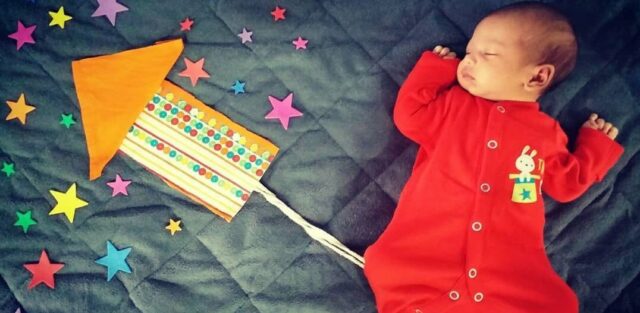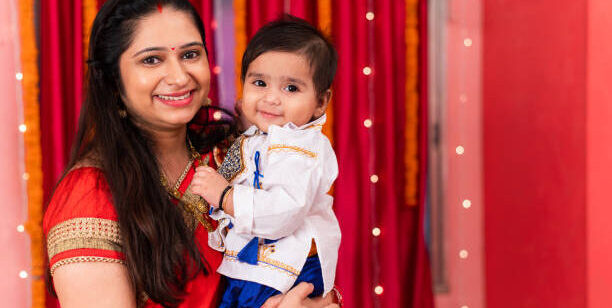Diwali is a time of joy, celebration, and togetherness, but for pregnant women, new mothers, and infants, it also brings unique challenges. The festive atmosphere, bustling with fireworks, sweets, and gatherings, requires special precautions to ensure everyone’s safety and well-being.
Dr. Monica Karthikeyan , a dedicated pediatrician at an AM Primary Health Care Centre, Chennai, emphasizes a preventive approach to health. Guided by the philosophy, “Prevention is better than cure,” Dr. Monica Karthikeyan works closely with families to foster healthy habits that significantly reduce the risks of illness. Through her proactive care, she empowers parents with essential knowledge about nutrition, physical activity, and preventive measures, supporting them in making informed decisions that enhance their children’s health.
In a recent interview, Dr. Monica Karthikeyan shared practical tips and advice for a safe and healthy Diwali celebration for expecting mothers, infants, and new moms, emphasizing the importance of first-aid preparedness, air quality, and sound control. Dr. Monica Karthikeyan shares that Diwali can be a joyful occasion for all, including pregnant women and infants, with a few safety measures. Here are her essential insights:
Firstly, a first-aid kit should be kept ready to handle anything, Dr.Monica Karthikeyan recommended the following necessary items.
1. Adhesive Bandages (Band-Aids) – For minor cuts
2. Sterile Gauze Pads and Tape – To cover larger wounds and control bleeding.
3. Disposable Gloves – For hygienic wound handling.
4. Alcohol Wipes – For cleaning wounds and surfaces.
5. Antiseptic Ointment (e.g., Silverex) – For treating minor burns and preventing infection.
6. Burn Gel or Cooling Gel – To relieve pain from minor burns.
7. Paracetamol Tablets – For pain relief and fever.
8. Eye Drops – To soothe eyes irritated by smoke or dust.
9. Cold Pack – For swelling or sprains.
10. Scissors – For cutting tape or gauze.
For Pregnant Women:
For many families, Diwali means deep cleaning and redecorating the home. However, Dr. Monica Karthikeyan advises pregnant women to avoid activities that involve lifting, bending, or moving heavy items, particularly during the last trimester.
“During pregnancy, your abdomen is large, and your center of gravity shifts. Your ligaments are loosened in preparation for labor, so it’s not the right time to lift or bend,” she explains. “Ask for help from your partner or family members to avoid physical strain.”
The loud noise of fireworks, often exceeding 110 decibels, can also be harmful, affecting both the mother and the baby.
“If the sound is very high, you may feel dizzy or unsteady, which can increase the risk of falls and injury,” Dr. Monica Karthikeyan says.
Pregnant women are encouraged to limit exposure to loud sounds, staying indoors during peak firework times or using earplugs and masks to protect against noise and smoke. “Smoke contains harmful substances like carbon monoxide and nitrogen dioxide, which can cause breathlessness and reduce oxygen for both mother and baby.”
Dr. Monica Karthikeyan also recommends special care with Diwali sweets, suggesting families avoid outside foods and opt for homemade sweets in moderation.
“Too much sugar can lead to gestational diabetes, a form of diabetes that develops during pregnancy,” she notes.
Excess sugar intake may also increase the risk of infections due to weakened immunity, which is already lower during pregnancy. To reduce health risks, she advises pregnant women to drink plenty of water, maintain a balanced diet, and limit coffee. “Replace coffee with healthier options like lime juice or fruit juice,” she suggests.
Clothing during Diwali should also prioritize comfort, especially for pregnant women. Dr. Monica Karthikeyan recommends choosing breathable, lightweight clothing over heavy traditional attire.
“If you want to wear heavy dress, limit it to just a few minutes, and then change to something comfortable,” she advises.
She also highlights the need to wear cotton fabrics when around fireworks, as cotton is less flammable than synthetic materials like silk.
Diwali rituals often involve lighting diyas, but Dr. Monica Karthikeyan reminds pregnant women to be mindful of their movements to avoid strain or accidental injury.
“Try not to bend too much when lighting diyas and avoid fasting as it can weaken both you and the baby,” she says.
For those traveling during Diwali, she recommends consulting with a gynecologist for necessary precautions, additional medications, and to discuss any risks.
For Infants:
The impact of noise and smoke pollution on infants and young children is also a major concern. Dr. Monica Karthikeyan explains that loud sounds above 110 decibels can lead to stress responses, hearing impairment, or, in rare cases, preterm labor.
“If exposed to constant noise, pregnant women and babies can become stressed, which raises blood pressure and reduces oxygen flow. This can affect the unborn baby’s development and may even lead to preterm delivery,” she warns.
To minimize exposure, she recommends staying indoors during peak hours, playing white noise or soothing music, and using earplugs for the mother and earmuffs for the baby.
Dr. Monica Karthikeyan emphasised the risks posed by smoke pollution, which can worsen respiratory conditions like asthma and bronchitis.
“If the mother is asthmatic or if the baby has respiratory issues, smoke can aggravate these conditions,” she says.
Pregnant women and infants should ideally remain indoors, and anyone exposed to smoke should monitor for symptoms like breathing difficulty or a persistent headache.
“If you feel unwell after exposure, rest, monitor baby movements, and go to the hospital if symptoms like abdominal pain or reduced fetal movement persist,” she adds.
In the event of firework injuries, Dr. Monica Karthikeyan outlines important first aid measures. She warns against rubbing the eyes if a spark or debris enters them, advising instead to rinse with water for five to ten minutes before seeking medical attention.
She also cautions against picking up unexploded fireworks or trying to increase firecracker effects by placing them in containers, as these actions can result in severe injuries.
“Always discard used fireworks in a bucket of water or sand to prevent injuries, and make sure everyone around is wearing footwear,” she advises.
In the case of burns, she recommends washing the area with water, avoiding remedies like toothpaste or ink, and applying antiseptic ointment if available.
Dr. Monica Karthikeyan highlights the importance of keeping infants comfortable during the celebrations.
“Their skin is very fragile, so dressing them in comfortable, breathable clothing is vital,” she suggests.
Infants should be adequately covered to protect them from dust and smoke, but the clothing should not be overly heavy or restrictive.
“If the weather is dry, you may apply a gentle moisturizer to keep their skin hydrated, but avoid using heavy creams that could clog their pores,” she advises.
If infants show symptoms like difficulty breathing or coughing, she advises moving them to a well-ventilated area and monitoring for improvement. For asthmatic individuals, she stresses the importance of keeping inhalers nearby.
In terms of dietary precautions, Dr. Monica Karthikeyan stresses that infants should ideally stick to their regular feeding routines during the festivities.
“If your infant is breastfeeding or formula-fed, ensure they stay hydrated and well-nourished,” she says.
Introducing sweets or outside food should be avoided, as infants’ digestive systems are still developing.
“The safest option is to maintain a balanced diet that’s appropriate for their age. Homemade foods can be introduced for older infants, but sweets should be given in moderation and under parental supervision,” she adds.
Dr. Monica Karthikeyan also addresses the importance of monitoring infants closely during this busy time.
“As family gatherings become more lively, ensure that someone is always watching the baby, especially around crowds or when fireworks are being used. This vigilance can prevent accidents and ensure that the infant is safe from potential hazards,” she advises.
If parents or caregivers notice any signs of distress in their infants, such as excessive crying, trouble breathing, or signs of allergic reactions, they should seek immediate medical attention.
By creating a calm environment, monitoring exposure to noise and smoke, and adhering to regular feeding routines, families can help ensure a joyful and safe Diwali for their little ones.
“Infants may not understand the festivities, but they can certainly feel the stress and excitement in their surroundings. Keeping their needs in mind allows the whole family to enjoy the festival together,” she concludes.
For New Moms:
Dr. Monica Karthikeyan begins by acknowledging the physical and emotional demands of being a new mom during the festive season.
“As a new mother, you may feel overwhelmed with the preparations and festivities. It’s crucial to prioritize your health and well-being, especially during Diwali,” she advises.
Diwali can be a stressful time for pregnant women, and Dr. Monica Karthikeyan encourages families to offer support.
“Pregnancy is a sensitive period. Family members should ensure that pregnant women have regular meals, stay hydrated, and get enough rest,” she says.
She encourages new moms to delegate tasks to family members and take breaks when needed.
“Don’t hesitate to ask for help. It’s okay to take a step back from physical strain, especially if you are still recovering from childbirth,” she adds.
One significant aspect Dr. Monica Karthikeyan said is the importance of managing noise and environmental stressors.
“Loud noises from firecrackers and celebrations can be unsettling, not just for infants but for new moms too,” she explains.
She suggests creating a calm space at home where new mothers can retreat if the festivities become too overwhelming.
“Consider using earplugs or listening to calming music to drown out the noise. Taking time for yourself, even for short moments, can help reduce stress,” she states.
Another key consideration is managing exposure to smoke and air pollution.
“During Diwali, the air quality can worsen due to firecrackers. For new mothers, especially those who may have respiratory sensitivities, it’s essential to stay indoors during peak times of firecracker usage,” Dr. Monica Karthikeyan advises.
If new moms must go outside, she recommends wearing a mask to filter harmful particles and ensure they are in a well-ventilated area upon returning home.
Diet is another crucial topic for new moms during the festive season.
“While it’s tempting to indulge in sweets and rich foods during Diwali, it’s important to maintain a balanced diet,” she warns.
Dr. Monica Karthikeyan suggests opting for homemade foods when possible and limiting sugar intake to avoid issues such as gestational diabetes or postnatal weight gain.
“Stay well-hydrated, and make sure to eat nutritious meals at regular intervals,” she adds.
Additionally, Dr. Monica Karthikeyan emphasizes the importance of self-care during this busy time.
“New moms often put their needs last, but taking care of yourself is vital for your health and the health of your baby,” she states.
She encourages moms to engage in activities that bring them joy, whether it’s a brief nap, reading, or simply spending quiet moments with their newborns.
“You might even find joy in connecting with other new moms, sharing experiences, and supporting one another during this hectic time,” she suggests.
Safety is also a significant concern during Diwali celebrations.
“Ensure that your environment is safe for your infant,” Dr. Monica Karthikeyan advises. “Be cautious around firecrackers and ensure that they are kept out of reach. If you’re participating in the celebrations, make sure you have someone to help look after your baby.”
Lastly, Dr. Monica Karthikeyan urges new moms to be attentive to their own and their baby’s health.
“If you notice any signs of distress—be it physical discomfort, extreme fatigue, or emotional overwhelm—do not hesitate to seek help,” she says. “It’s crucial to prioritize your mental well-being. Diwali is a celebration, and taking care of yourself allows you to enjoy the festivities to the fullest.”
One of the most crucial safety tips Dr. Monica Karthikeyan shares is regarding the use of hand sanitizer near fireworks as its usage get increased after Covid-19.
“Sanitizer contains alcohol and is highly flammable. Never apply it before handling firecrackers,” she warns, suggesting washing hands with soap and water instead.
This can help prevent severe burn injuries, as any accidental ignition of the alcohol can cause immediate burns.
With these simple precautions, families can enjoy a safe and joyful Diwali. Dr. Monica Karthikeyan’s advice helps to ensure that pregnant women, new moms and infants are protected, allowing everyone to fully enjoy the festival of lights in a safe and healthy way.






Thank you
You have brought up a very superb details , thankyou for the post.
Super helpful and straight to the point.
I found this post very helpful.